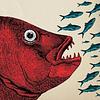Take a photo of a barcode or cover

iainiainiainiain 's review for:
The Island Of Doctor Moreau
by H.G. Wells
I really liked The War of the Worlds. The themes were so interesting and there was no reason I shouldn't like it, but I did find the style a bit grating and whole chapters were undoubtedly boring. Wells would go into this detached, observational mode where he would describe events happening elsewhere like he was a newspaper journalist.
The Island of Dr Moreau is not like that at all. It was exciting, page-turning, and scary. Like The War of the Worlds, there's a lot to unpack and it sidesteps easy interpretation. From what I can tell there are two real themes:
The more subtle theme is colonialism. While it's impossible to ignore the fact it's *the British Empire* being invaded in The War of the Worlds, I think it's also impossible to ignore the fact Dr Moreau's island is A PLANTATION with master/slave relations and a civilising mission. While a colonial project is justified as being to the benefit of the colonised (see Kipling's White Man's Burden), it is ultimately about the power and control provided to the coloniser. Wells tells us that such a project is doomed to fail and cause unthinkable suffering.
Now the only issue with this reading is that while the book is clearly against this sort of thing (colonialism, slavery), its delivery is undoubtedly racist. Like a few books in this vein, it portrays the Europeans as humans and the colonised as wild animals (do I need to state why this is bad). Books like Word for World is Forest by Le Guin and Downward to the Earth by Silverberg use a similar trope; but the difference with those is that their conclusion is "turns out the de-humanised subjects were actually human!", while Wells' conclusion is "turns out we were right, they are beasts!" 💀
Either I'm reading too much into it and he's just drawn inspiration from colonial concepts to write a scary story, or it's a reflection of Victorian attitudes towards the global south being out of wack even at the best of times.
Then the other far more in your face theme is the "should there be limits to science", "just because we can, doesn't mean we should" etc, and I think it's a powerful story about how science and scientists shouldn't be placed on a pedestal. Scientists have the capacity to inflict unimaginable pain and suffering and shouldn't be excused just because it's "science" or "progress". Similar to colonialism, science can be an ideologically-driven, 'ends justify the means' project also about power and control.
In the age of psychopaths we're in (the Elon Musks and Peter Thiels of the world), this kind of madness doesn't feel like a stretch at all. In 2035, when tech-billionaires start offering to alter your dog so it can talk to you, perhaps we can think about whether that would be cute or nightmarish beyond comprehension.
The Island of Dr Moreau is not like that at all. It was exciting, page-turning, and scary. Like The War of the Worlds, there's a lot to unpack and it sidesteps easy interpretation. From what I can tell there are two real themes:
The more subtle theme is colonialism. While it's impossible to ignore the fact it's *the British Empire* being invaded in The War of the Worlds, I think it's also impossible to ignore the fact Dr Moreau's island is A PLANTATION with master/slave relations and a civilising mission. While a colonial project is justified as being to the benefit of the colonised (see Kipling's White Man's Burden), it is ultimately about the power and control provided to the coloniser. Wells tells us that such a project is doomed to fail and cause unthinkable suffering.
Now the only issue with this reading is that while the book is clearly against this sort of thing (colonialism, slavery), its delivery is undoubtedly racist. Like a few books in this vein, it portrays the Europeans as humans and the colonised as wild animals (do I need to state why this is bad). Books like Word for World is Forest by Le Guin and Downward to the Earth by Silverberg use a similar trope; but the difference with those is that their conclusion is "turns out the de-humanised subjects were actually human!", while Wells' conclusion is "turns out we were right, they are beasts!" 💀
Either I'm reading too much into it and he's just drawn inspiration from colonial concepts to write a scary story, or it's a reflection of Victorian attitudes towards the global south being out of wack even at the best of times.
Then the other far more in your face theme is the "should there be limits to science", "just because we can, doesn't mean we should" etc, and I think it's a powerful story about how science and scientists shouldn't be placed on a pedestal. Scientists have the capacity to inflict unimaginable pain and suffering and shouldn't be excused just because it's "science" or "progress". Similar to colonialism, science can be an ideologically-driven, 'ends justify the means' project also about power and control.
In the age of psychopaths we're in (the Elon Musks and Peter Thiels of the world), this kind of madness doesn't feel like a stretch at all. In 2035, when tech-billionaires start offering to alter your dog so it can talk to you, perhaps we can think about whether that would be cute or nightmarish beyond comprehension.